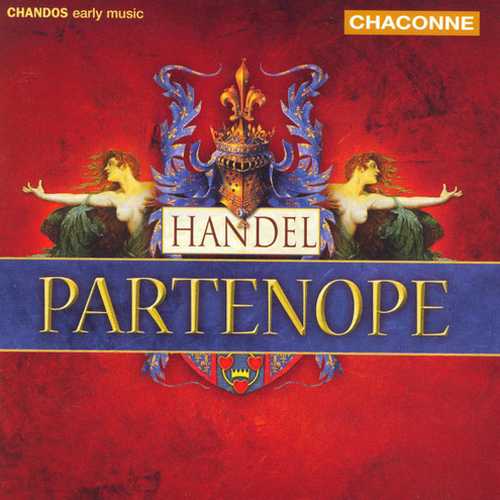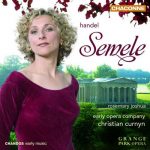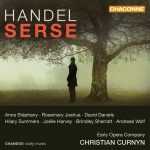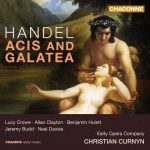

Composer: George Frideric Handel
Performer: Lawrence Zazzo, Hilary Summers, Kurt Streit, Rosemary Joshua, Stephen Wallace, Andrew Foster-Williams
Orchestra: Early Opera Company Orchestra
Conductor: Christian Curnyn
Number of Discs: 3
Format: FLAC (tracks)
Label: Chandos
Catalogue: CHAN0719
Release: 2005
Size: 3.31 GB
Recovery: +3%
Scan: yes
Partenope, HWV 27
CD 01
01. Overture
02. Act I Scene 1: Tu dell’ eccelse Mura (Thou to the lofty Walls) (Partenope)
03. Act I Scene 1: Viva viva Partenope viva (Oh live Parthenope! Live Ages o’er) (Chorus) – Miei Fidi arride il Cielo (My Friends, Heaven views us with a Look benign) (Partenope)
04. Act I Scene 2: Arsace (Arsaces) (Armindo, Arsace, Partenope, Rosmira)
05. Act I Scene 3: Regina, in folte Schiere (Great Queen!) (Ormonte, Arsace, Armindo, Partenope, Rosmira)
06. Act I Scene 3: L’ Amor ed il Destin (Both Love and Fate shall meet) (Partenope)
07. Act I Scene 3: O Eurimene ha l’ idea di Rosmira (Or Eurimines has Rosmira’s Air) (Arsace)
08. Act I Scene 4: Cavalier, se gli Dei (Sir, if the Gods have not inclined your Thoughts) (Rosmira, Armindo)
09. Act I Scene 4: Se non ti sai spiegar (If then you fear to speak) (Rosmira)
10. Act I Scene 4: Armindo ardisci e prova (Be resolute Armindo, and attempt) (Armindo)
11. Act I Scene 4: Voglio dire al mio tesoro (Now to my lovely Fair I’ll fly) (Armindo)
12. Act I Scene 5: Ah! Ch’ un volto fatal mi da gran pena! (What Pangs I suffer from a fatal Face!) (Arsace, Rosmira)
13. Act I Scene 5: Un altra volta ancor (You promised, Faithless, once before) (Rosmira)
14. Act I Scene 5: Rosmira, oh! Dio! Rosmira (Rosmira, Oh ye Gods! the fair Rosmira) (Arsace)
15. Act I Scene 5: Sento Amor con novi Dardi (Love unrelenting, with a varied Dart) (Arsace)
16. Act I Scene 6: Stan pronti i miei Guerrieri a stringer l’ armi? (Are my brave Warriors now prepared for Battle?) (Partenope, Ormonte)
17. Act I Scene 6: T’ appresta forse amore (Or Love perhaps may bid you arm) (Ormonte)
18. Act I Scene 7: Signora (My Queen) (Armindo, Partenope)
19. Act I Scene 8: E di che reo son Io? (And in what fatal Act have I offended?) (Arsace, Partenope) – Per te moro (For thee the Pangs of Death I prove) (Arsace, Partenope) – Taci, basta (Enough, my Fairest, O forbear) (Arsace, Partenope)
20. Act I Scene 9: E se giunge Eurimene? (And what tho’ Eurimenes now approaches) (Partenope, Arsace, Rosmira)
21. Act I Scene 9: Sei mia gioja, sei mio bene (Thou art my Joy, in thee I’m blest) (Partenope)
22. Act I Scene 9: I novelli amor tuoi (I’ve heard myself your new concerted Passion) (Rosmira, Arsace)
23. Act I Scene 9: Dimmi pietoso Ciel (Tell me, ye gracious Power, that rule the Sky) (Arsace)
24. Act I Scene 10: Ecco Emilio (Behold Emilius) (Ormonte, Emilio, Partenope, Armindo, Rosmira, Arsace)
25. Act I Scene 10: Anch’ Io pugnar sapro (Now War shall all my Thoughts engage) (Emilio)
26. Act I Scene 11: Arsace, tu sarai (To you, Arsaces, as my General) (Partenope, Armindo, Rosmira, Arsace, Ormonte)
27. Act I Scene 11: Io ti levo l’ Impero dell’ Armi (Your Power in Arms I now control) (Partenope)
28. Act I Scene 12: Lascia deh! lascia, o Prence (Forbear, let me entreat you, Prince, forbear) (Arsace, Rosmira, Armindo)
29. Act I Scene 12: E figlio il mio timore (The Fears my throbbing Heart express) (Arsace)
30. Act I Scene 13: Prence, di te mi lagno (Ah Prince! with Reason I reproach your Conduct) (Armindo, Rosmira)
31. Act I Scene 13: Io seguo sol fiero (My Genius leads me to the Glades) (Rosmira)
CD 02
01. Act II Scene 1: Sinfonia
02. Act II Scene 1: Forti mie Schiere, alla vicina Impresa (My martial Troops, to the approaching Combat) (Emilio)
03. Act II Scene 1: Marche
04. Act II Scene 1: Ma le nemiche Squadre (The hostile Squadrons) (Emilio, Partenope)
05. Act II Scene 1: Con valorosa mano (With a victorious Hand) (Emilio, Partenope, All)
06. Act II Scene 1: Soccorso (Assist me) (Partenope, Armindo)
07. Act II Scene 1: Sinfonia
08. Act II Scene 1: Renditi, o pure estinto (Yield, or you die) (Emilio, Arsace, Rosmira, Partenope, Ormonte)
09. Act II Scene 1: Vi circondi la Gloria d’ Allori (May Laurel grace your Brows sublime) (Partenope, Arsace, Armindo, Rosmira, Ormonte)
10. Act II Scene 2: Contro un pudico Amor cotanto sdegno (And can such Scorn pursue my purest Passion) (Emilio)
11. Act II Scene 2: Barbaro Fato si (Yes, Fate, I feel thy cruel Doom) (Emilio)
12. Act II Scene 3: Care Mura in si bel giorno (Ye pleasing Walls) (Partenope)
13. Act II Scene 3: Emilio! (Emilius!) (Partenope, Emilio, Rosmira, Arsace, Ormonte, Armindo)
14. Act II Scene 3: Voglio amare insin ch’ Io moro (Till Death divides me from my Love) (Partenope)
15. Act II Scene 4: Ti bramo Amico, e teco (My Soul is fond of thee, my Friend) (Arsace, Emilio, Armindo, Rosmira)
16. Act II Scene 4: E vuoi con dure tempre (And will that unrelenting Mind) (Arsace, Rosmira)
17. Act II Scene 5: Non puo darsi in un petto (No Breast did ever sure contain before) (Emilio, Armindo, Rosmira)
18. Act II Scene 5: Furie son dell’ Alma mia (Revenge and Rage and jealous Pain) (Rosmira)
19. Act II Scene 6: A pro di chi t’ offese (And how can you imploy thes friendly Prayers) (Partenope, Arsace)
20. Act II Scene 6: Porterti dir vorrei (I wish, believe me, to impart) (Arsace)
21. Act II Scene 7: Regina (My Queen) (Armindo, Partenope)
22. Act II Scene 7: Non chiedo o luci vaghe (Dear charming Eyes that pierced my Heart) (Armindo)
23. Act II Scene 7: Piu d’ ogn’ altro sarebbe (I owe his Merit, and confess, that none) (Partenope)
24. Act II Scene 7: Qual Farfalletta (Like the poor Wanton in the Night) (Partenope)
25. Act II Scene 8: Quanto godo Eurimene (How do I joy to see my Eurimines) (Armindo, Rosmira)
26. Act II Scene 9: Rosmira mia, mio bene! (O my Rosmira! my Soul’s better Part) (Arsace, Rosmira)
27. Act II Scene 9: Furibondo spira il vento (The furious Blast resistless flies) (Arsace)
CD 03
01. Act III Scene 1: Sinfonia
02. Act III Scene 1: Regina ti compiace (Is it your Will, great Queen) (Armindo, Partenope, Arsace, Emilio)
03. Act III Scene 1: Non e incauto il mio consiglio (I harbour no uncautious Thought) (Armindo, Emilio, Arsace, Partenope)
04. Act III Scene 2: Partenope, Eurimene (To you, Parthenope, see Eurimenes) (Rosmira, Partenope, Arsace, Armindo, Emilio)
05. Act III Scene 2: Arsace, oh Dio! cosi (This was Arsaces’ guilty Part) (Rosmira)
06. Act III Scene 2: Chi m’ apre i lumi, e che mi scioglie il Core? (What Power has undeceived me, and unchained My captive Heart?) (Partenope, Emilio, Armindo)
07. Act III Scene 2: Spera e godi o mio Tesoro (Joys attend my dearest Treasure) (Partenope)
08. Act III Scene 3: Prencipe ardir (Now, Prince, be resolute) (Emilio, Armindo, Rosmira, Arsace)
09. Act III Scene 3: La Speme ti consoli (May pleasing Hope your Cares control) (Emilio)
10. Act III Scene 4: Rosmira, ove ti guida (Where, my Rosmira, does thay Tyrant rage?) (Arsace, Rosmira)
11. Act III Scene 4: Ch’ Io parta? si crudele (And must I, cruel Maid, depart?) (Arsace)
12. Act III Scene 4: Oh Dio! perche dal petto (Oh Heavens! methinks I feel my struggling Heart) (Rosmira)
13. Act III Scene 4: Quel volto mi piace (His lovely Frame my Fancy charms) (Rosmira)
14. Act III Scene 5: Ormonte, ti destino (Ormontes, you I constitute the Judge) (Partenope, Ormonte, Armindo)
15. Act III Scene 5: Nobil Core, che ben ama (A noble Heart that fondly loves) (Armindo)
16. Act III Scene 6: Non chiedo, oh miei tormenti! (I ask ye not, ye Woes I bear) (Arsace)
17. Act III Scene 6: Ma quai note di mesti lamenti (What Notes that mourn in such a solemn Sound) (Arsace)
18. Act III Scene 7: Cieli che miro! abbandonato e solo (Heavens! What do I behold!) (Rosmira)
19. Act III Scene 8: Ma Partenope vien, finger degg’ Io (Parthenope approaches, I must feign) (Rosmira, Partenope, Arsace)
20. Act III Scene 8: Un Cor infedele (The Heart whose Love was never true) (Partenope, Arsace, Rosmira)
21. Act III Scene 8: Passo di duolo in duolo (From Grief to Grief I make my fatal Progress) (Arsace)
22. Act III Scene 8: Fatto e Amor un Dio d’ Inferno (Tyrannick Love is justly made A God of the Infernal Shade) (Arsace)
23. Act III Scene 9: Di bel Desire avvampo (I’m all impatient to defend Arsaces) (Emilio, Armindo)
24. Act III Scene 9: La Gloria in nobil alma (True Glory in a gallant Breast) (Emilio)
25. Act III Scene 9: Sinfonia
26. Act III Last Scene: Regina, in queste arene (Great Queen) (Ormonte, Partenope, Emilio, Rosmira, Armindo, Arsace)
27. Act III Last Scene: Si scherza si (Love wantons with a double Flame) (Partenope)
28. Act III Last Scene: Armindo sia mio Sposo (Armindo, I receive you for my Spouse) (Partenope, Armindo, Arsace, Rosmira)
29. Act III Last Scene: D’ Imeneo le belle Sede (May Hymen’s lovely Taper blaze) (Chorus)
Handel composed Partenope for the 1730 London season, less than a year into the so-called ‘Second Academy’ period in which he enjoyed increased artistic control over his productions. Partenope was a subject he had long coveted and with a new troupe of singers, less starry than before, he seems to have relished the chance to tone down the rattling virtuosity in favour of a more ‘company’ feel, and with it a more genuine and subtle mode of expression. He was helped by a strong libretto which is well set-out, humane with a touch of gentle humour, and features characters who are lifelike and credible.
Partenope, Queen of Naples, is wooed by three suitors – the overly proud enemy general Emilio, the mopy but deserving Armindo, and her own favourite, Arsace. Arsace, however, is tormented by the woman he left behind, Rosmira, who is hanging around and making mischief disguised as a man. Eventually, and after much soul-searching, Arsace forces her to reveal her identity by challenging her to a bare-chest duel (which she declines). The couple are reunited, Partenope settles for Armindo, and Emilio accepts his rejection philosophically.
Christian Curnyn conducts a highly competent performance thoroughly in the groove of modern Handelian style, with a cast that has no vocal weaknesses and many dramatic virtues: Rosemary Joshua as Partenope and Hilary Summers as Rosmira have the most technically demanding music, but Joshua’s brightly confident singing also effortlessly suggests a woman both regal and desirable, while the dark-voiced Summers sounds like someone not to be messed with. Lawrence Zazzo conveys well the deepening suffering of Arsace, Stephen Wallace shows us the emerging nobility of Armindo, and if Kurt Streit sounds rather like a tenor stepping out of his usual Mozartian realm, then as the pompous Emilio he does need to be a little out of step with the others and his voice and Italian diction are both irresistibly splendid. In general the singing has a warmth to it, and although there are times when the recitatives could make room for more dramatic flexibility and conviction, this is nevertheless a thoroughly recommendable release for Baroque opera fans.



